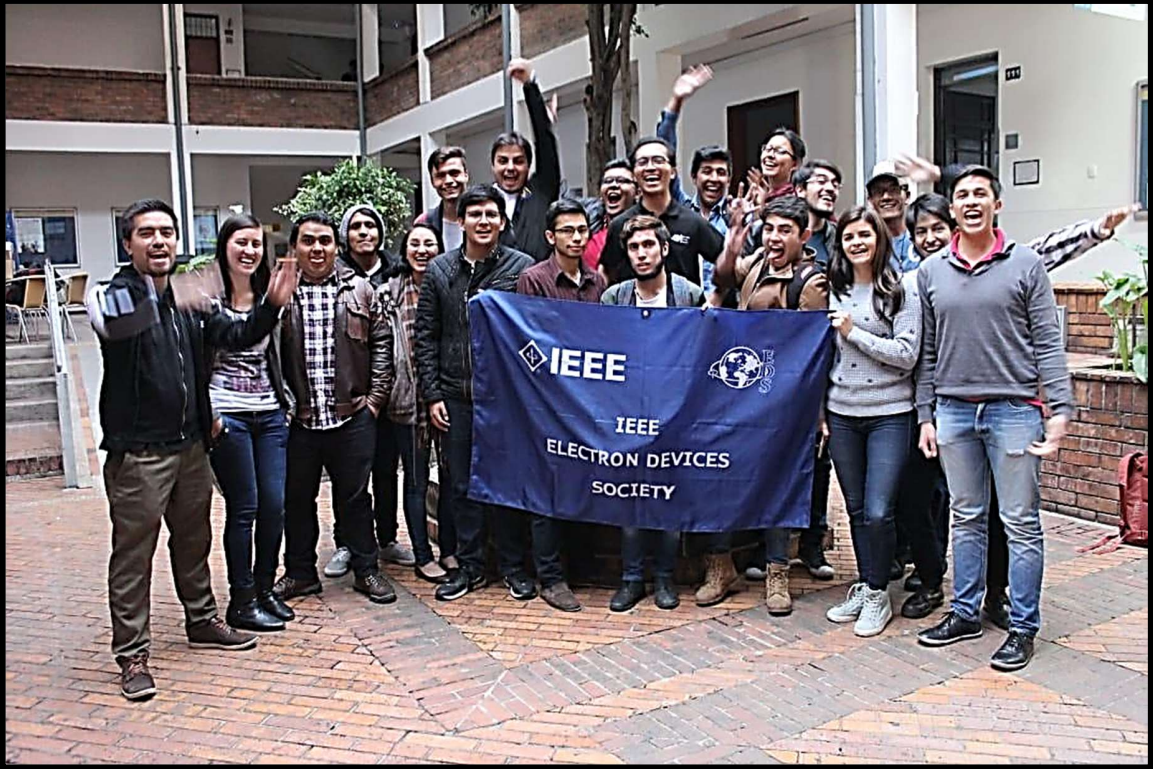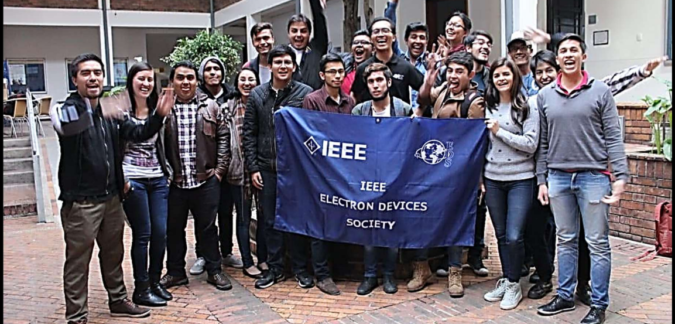Volunteers understand the need to not only make changes that will impact individual situations but will also create a better place for everyone involved. We know that basic human needs are far and plenty. It is our responsibility to take care of these problems and also to build new opportunities that will guide and motivate more volunteers to be a part of the same change.
 Since December 2017, the topic of “NAVIDAD FIEEELIZ 2017” has inspired volunteers to join forces to obtain better results. From this, the SNAP CIRCUITS (EDS Colombia) and SIGHT Colombia programs were created.
Since December 2017, the topic of “NAVIDAD FIEEELIZ 2017” has inspired volunteers to join forces to obtain better results. From this, the SNAP CIRCUITS (EDS Colombia) and SIGHT Colombia programs were created.
The experience gained for both teams and their initiatives could be the beginning of new proposals that offer more participation in the communities across the EDS program. This work could also be the first step for work in the communities, with the idea to create social impact projects.

This is the first step of the SNAP WORLD program, an initiative developed between Luis Miguel Quevedo, Camilo Téllez, and Oscar Rodríguez, who are all IEEE members. The initiative aims to give volunteers the capacity to obtain tools and share knowledge across the SNAP CIRCUIT equipment for work with the communities.
 SNAP WORLD is a training program where volunteers not only learn about the equipment and their capabilities, but also soft skills in which they can use to teach the communities with common examples in a colloquial way. The program seeks volunteers who are able to teach engineering through daily experiences and concepts. By this reason the workshop was designed into two sessions so that the assistants were able to learn technical skills in one session and soft skills in another.
SNAP WORLD is a training program where volunteers not only learn about the equipment and their capabilities, but also soft skills in which they can use to teach the communities with common examples in a colloquial way. The program seeks volunteers who are able to teach engineering through daily experiences and concepts. By this reason the workshop was designed into two sessions so that the assistants were able to learn technical skills in one session and soft skills in another.
 In the first session, the volunteers worked with the SC-100 platform and learned about the equipment and its different capabilities. Over the course of the session, the volunteers were able to develop some exercises and ways to translate that knowledge into terms that can be easily understood by children through gestures and story-telling. The volunteers enjoyed the activity, because they understood that they could teach and share the knowledge with others in a didactic form.
In the first session, the volunteers worked with the SC-100 platform and learned about the equipment and its different capabilities. Over the course of the session, the volunteers were able to develop some exercises and ways to translate that knowledge into terms that can be easily understood by children through gestures and story-telling. The volunteers enjoyed the activity, because they understood that they could teach and share the knowledge with others in a didactic form.
In the second session, we worked with the SNAPINO platform. As you know, it is more complex than the SC-100. However, our goal is that the volunteers go beyond simply learning more about this platform. That is because in this session, many volunteers are first-year students at the University, and don’t understand ADRDUINO technology. For this reason, we complemented their training process, explaining how we can translate ordinary life activities such as “making breakfast” into simple steps. After the comparison with ordinary life activities broken up into simple steps, the volunteers were able to understand that this is the most common and effective way to build an algorithm and write programs.

This activity helped to teach the volunteers how to explain programming with the addition of flow diagrams using platforms such as ARDUNIO. They were also able to apply this knowledge to teach the children how to identify mistakes in the code.


As a result, there was a participation of 11 volunteers from various universities in Bogotá who were all motivated by the goals of the program and actively participating. Overall, the feedback from the participants were all very positive with many stating that not only will they participate in future events, but they would also like to work with the communities in these sort of activities.
 The group is planning some sessions with the communities to offer opportunities to work face to face where children and volunteers can apply what has been learned. There is also interest in the group to create the same workshop but with other volunteers, not just in Colombia but in other countries in Region 9 as well.
The group is planning some sessions with the communities to offer opportunities to work face to face where children and volunteers can apply what has been learned. There is also interest in the group to create the same workshop but with other volunteers, not just in Colombia but in other countries in Region 9 as well.
Last but not least, the SIGHT group wanted to share their gratitude with the Universidad Católica de Colombia and their student branch for providing spaces and logistics to host the event. The success of this session would not have been feasible without them.

The leaders of the initiative:
 Luis Miguel Quevedo. Luis Miguel was born in Bogota, Colombia, in 1987. He received his B.S. and M.S. degrees in mechatronic engineering from the University of San Buenaventura, Bogota, in 2015 and the specialization degree in business and services of telecommunications from the same University, in 2016. In 2015, he founded JWG S.A.S a company implementing automation solutions in Colombia for companies including: General Motors, Andina, Quala S.A., and PEPSICO. He has led the EDSETC program since 2017. His interests include Internet of Things, STEM, factory automation, nanoparticles, and innovation on sensor less control. He is a member of committee of student activities in the IEEE Colombia Section. Mr. Quevedo was a recipient of the Industry Applications Society Award outstanding student branch chapter in 2013, Honorable mention of University of San Buenaventura to the effort, development and leadership skills during the B.S. in 2015.
Luis Miguel Quevedo. Luis Miguel was born in Bogota, Colombia, in 1987. He received his B.S. and M.S. degrees in mechatronic engineering from the University of San Buenaventura, Bogota, in 2015 and the specialization degree in business and services of telecommunications from the same University, in 2016. In 2015, he founded JWG S.A.S a company implementing automation solutions in Colombia for companies including: General Motors, Andina, Quala S.A., and PEPSICO. He has led the EDSETC program since 2017. His interests include Internet of Things, STEM, factory automation, nanoparticles, and innovation on sensor less control. He is a member of committee of student activities in the IEEE Colombia Section. Mr. Quevedo was a recipient of the Industry Applications Society Award outstanding student branch chapter in 2013, Honorable mention of University of San Buenaventura to the effort, development and leadership skills during the B.S. in 2015.
 Camilo E. Téllez. Camilo studied electronic engineering at Universidad de San Buenaventura (Bogotá), since 2004 to 2009. Between 2010 and 2012, he worked like teacher in the same university. In 2012, he started master studies in Nanoelectronics systems at Technische Universitat Dresden in Germany. His worked is focused in the institute of for materials science, TU Dresden, Germany, in themes related to print techniques, like alternative methods, for develop sensors. Between 2016 – 2017, he has been advisor and professor of Escuela Tecnológica Instituto Técnico Central la Salle and Universidad Católica de Colombia, where he is recently professor.
Camilo E. Téllez. Camilo studied electronic engineering at Universidad de San Buenaventura (Bogotá), since 2004 to 2009. Between 2010 and 2012, he worked like teacher in the same university. In 2012, he started master studies in Nanoelectronics systems at Technische Universitat Dresden in Germany. His worked is focused in the institute of for materials science, TU Dresden, Germany, in themes related to print techniques, like alternative methods, for develop sensors. Between 2016 – 2017, he has been advisor and professor of Escuela Tecnológica Instituto Técnico Central la Salle and Universidad Católica de Colombia, where he is recently professor.
 Oscar J. Rodríguez. Electronic engineer of Universidad de San Buenaventura, in Bogotá Colombia, with Master on Business Administration MBA of Universidad Sergio Arboleda with emphasis in International Business in Bogotá Colombia. Oscar has been IEEE volunteer since 2007, during this time he was student branch chair of Universidad de San Buenaventura, part of the Colombian Student Activities Committee staff, Co-chair of the Student Master Thesis Contest of Industry Applications Society. Vice Chair of the professional Chapter in Colombia; Membership development coordinator for Colombia. Since 2013, he founded and lead the SIGHT Colombian team, to 2017. Since 2016 and 2018, he was a part of the Steering Committee for SIGHT like operations chair. In Colombia, he is a Professor at Universidad de San Buenaventura with emphasis in social impact initiatives, is consultor for small and mediums entrepreneurship about business strategy, and is working in SIGHT Colombia as New Initiatives Coordinator.
Oscar J. Rodríguez. Electronic engineer of Universidad de San Buenaventura, in Bogotá Colombia, with Master on Business Administration MBA of Universidad Sergio Arboleda with emphasis in International Business in Bogotá Colombia. Oscar has been IEEE volunteer since 2007, during this time he was student branch chair of Universidad de San Buenaventura, part of the Colombian Student Activities Committee staff, Co-chair of the Student Master Thesis Contest of Industry Applications Society. Vice Chair of the professional Chapter in Colombia; Membership development coordinator for Colombia. Since 2013, he founded and lead the SIGHT Colombian team, to 2017. Since 2016 and 2018, he was a part of the Steering Committee for SIGHT like operations chair. In Colombia, he is a Professor at Universidad de San Buenaventura with emphasis in social impact initiatives, is consultor for small and mediums entrepreneurship about business strategy, and is working in SIGHT Colombia as New Initiatives Coordinator.
This project was developed thanks the alliance between:



